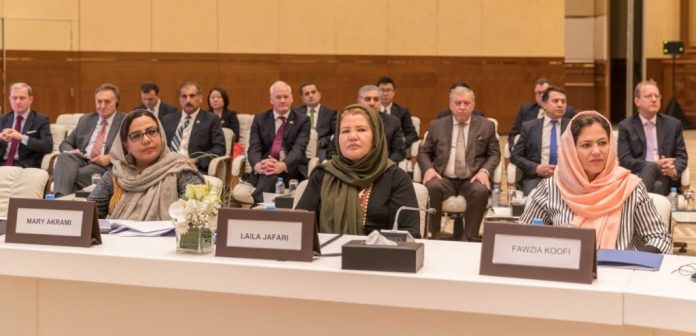It is official now. An attempt is in operation to resolve the eighteen-year long war in Afghanistan to the utter satisfaction of the warring parties: the US and the Taliban. Meanwhile, the US appears both enthusiastic and desperate in its quest for a negotiated end to the long-pending crisis. The US enthusiasm is rooted in its attempt to take credit for ending the fierce war amicably while its desperation is rooted in leaving Afghan soil with some reputation and strength from its perspective.
US president Donald Trump’s strategy seems to see the unresolved Afghan war as a sign of weakness in America’s huge military power. Washington has not been in a position to counter the Taliban onslaught ever since the war began following the latter’s removal from the Afghan government. Despite America’s conventional and technological superiority, the Taliban managed to secure a dominant position for itself in the marathon war.
Seeing the insurgent group’s growing dominance and determination to force the US-led forces out of Afghanistan, Washington made a U-turn to engage the Taliban in negotiations. That’s not only meant the acceptance of the insurgents as a party to the Afghan crisis but also the sending of a message across that the US forces are exhausted and cannot end the war militarily. While the US political acumen is appreciable, the circumstances that have unfolded in Afghanistan and the region are a cause of concern. The Taliban do not consider the Afghan government legitimate and call it a ‘puppet’ while Kabul does not enjoy good relations with the neighboring Iran and Pakistan. A few questions: once the US is out, how will the Taliban, Tehran and Pakistan behave? Will peace prevail or will a new phase of violence take over?
Back to the Afghan war, US envoy Zalmay Khalilzad has been engaged with negotiations with the Afghan Taliban for a long time. Talks with the insurgent forces have been held at Doha in Qatar, Russia and Pakistan. Although the talks have reportedly been fruitful towards peace, there has been no forward movement on the future government in Afghanistan and the mechanism that will guide the governance. Anyway, negotiations are a positive step to lead the war-torn country out of the mire of miseries and hardships.
What is encouraging is that the Taliban, notwithstanding its strong and advantageous position in the war, seems in a positive and empathetic frame of mind to resolve the conflict and give peace a chance. They have never stayed or pulled out of any round of talks, thus indicating their desire to prevent further loss of men and material in Afghanistan.
Going a step further, the US has wisely taken China, Russia and Pakistan into confidence towards resolving the Afghan war and thus leaving the country in peace. Recently, the four countries held talks in Beijing. The subject of the discussion was to find out the peaceful ways and means for ending the conflict. Interestingly, the three countries have shown their intent to help America resolve the crisis – the crisis if resolved will do well to them as well.
For Pakistan, the respectable and amicable end to the Afghan war will prove a blessing in disguise. Islamabad has not been in good terms with Washington over the former’s alleged support to the Afghan Taliban. The strained ties have aggravated Pakistan’s ailing economy as the Trump administration has stopped financial aid to it. A helping hand by Pakistan in Afghan peace will surely thaw its relations with the US. That can bring it much-needed financial support from Washington. Islamabad also aims at good ties with the Taliban once the latter come to power in Afghanistan. Good ties with Afghanistan will not only boost trade with Pakistan but also resolve the huge refugee crisis and its resultant issues like drug trafficking. Afghan war has forced millions of people to flee to Pakistan for shelter, an unnecessary burden on Pakistan’s exchequer.
For China, a peaceful and stable Afghanistan is a paradise. Beijing has been accused of human rights violations in its western province, Xinjiang. Recently, some 22 countries co-signed a letter to the UNO, asking the institution to take care of China’s alleged worse human rights record in the restive province. Though Beijing called it a “slander” and some 52 countries co-signed a letter in response to defend it, the communist state is not comfortable with the state of affairs. Moreover, China’s Taiwan issue, the trade war (with the US) and the safety of CPEC are giving it sleepless nights. To take on these issues, Beijing looks forward to improve her ties with America and, therefore, seems focused on helping Washington resolve the Afghan crisis.
Russia too can benefit by the peaceful resolution of Afghan conflict. Moscow is reeling under a series of US sanctions ever since it annexed Crimea and has been suspected of offering covert support to the Taliban. The “Moscow Format” for a political solution of Afghan war saw the Taliban welcome in Russia, pointing to a link between the two. Hence, Moscow expects that by helping in resolving the Afghan crisis, it can prove its leadership role in peacemaking in the world, gain some relief in the sanctions and ensure that the future Afghan government (a coalition government with the Taliban) maintains goodwill and positive approach towards it.
So with the atmosphere in Afghanistan and the region favorable to end the long war, the US and the Taliban should see neither disgrace nor pride in their respective positions in the crisis. The two warring sides must continue to hold negotiations, involving the regional players and the Kabul government as well if lasting peace and stability is to be achieved in Afghanistan. A power sharing equation involving all the regions and sections of Afghanistan – is the key for durable peace in the country. Anything minus that is a passport to political tsunami.
The views and opinions expressed in this articl are those of the author and do not necessarily reflect the official policy or position of The Geopolitics.

Sheikh Shabir Kulgami is a Kashmiri (Indian) political commentator, analyst and columnist. He writes extensively on South Asia.


